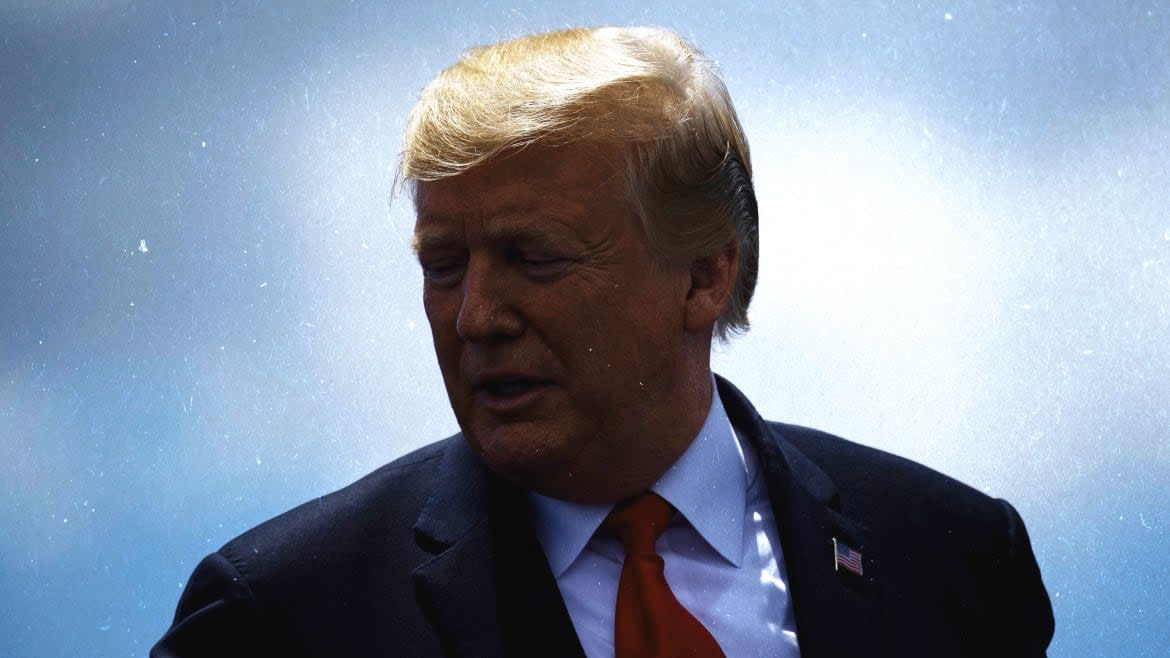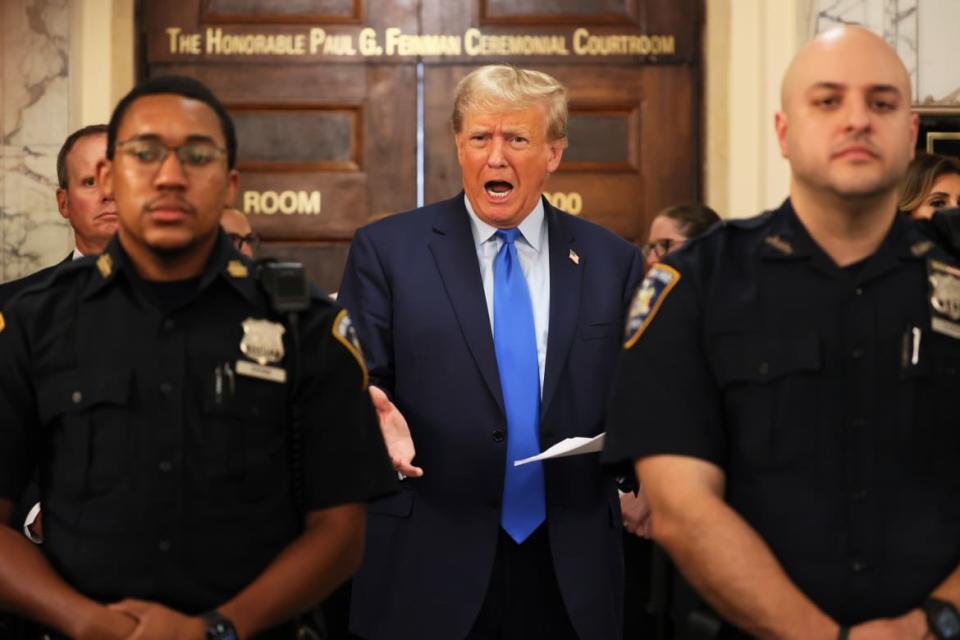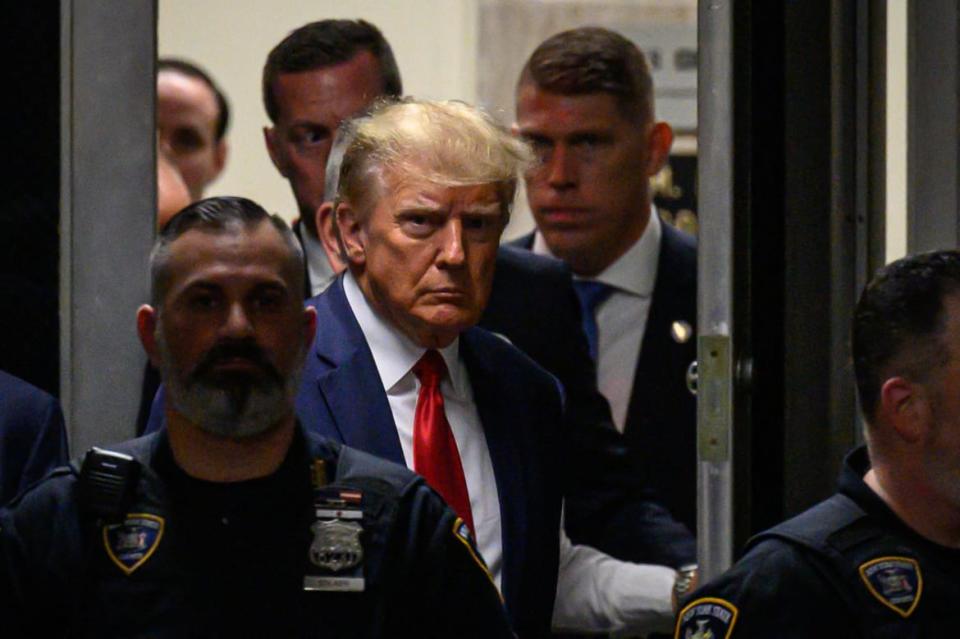This Trump Trial Will Decide If Cheaters Can Run for Office

- Oops!Something went wrong.Please try again later.
- Oops!Something went wrong.Please try again later.
Former President Donald Trump and his lawyers don’t seem to understand the concept of disqualification. It means you don’t get to play.
In the Colorado lawsuit seeking to disqualify him from being on the state ballot for the 2024 presidential election, Trump’s argument boils down to claiming that voters—not courts—should decide whether he can win back the presidency. As his lawyer, Scott Gessler puts it: “(This lawsuit) looks to extinguish the opportunity… for millions of Coloradans—Colorado Republicans and unaffiliated voters—to be able to choose and vote for the presidential candidate they want.”
In a Minnesota lawsuit seeking a judicial declaration that Trump is disqualified from becoming a presidential candidate again, and asking that the Minnesota secretary of state exclude Trump from the March 5, 2024, presidential nomination primary, Trump’s lawyers took a similar tact. They wrote in legal pleadings that “the federal Constitution and Minnesota law place the resolution of this political issue where it belongs: the democratic process, in the hands of either Congress or the people of the United States.”
Judges Need to Make It Clear to Trump That Their Gag Orders Aren’t Optional
To illustrate the problem with these core arguments of Trump’s, one need only look at sports analogies. Imagine Rosie Ruiz—disqualified from the 1980 Boston Marathon after using the subway for part of the race—arguing that she should have kept her win because she still crossed the finish line first. Or Mike Tyson— disqualified after biting off part of Evander Holyfield’s ear in a 1997 boxing match—arguing that the fight should have gone on. The whole point is to enforce the rules and not let cheaters compete.
The relevant rules in these cases are found in Section 3 of the 14th Amendment—which bars from federal office any person who previously took an oath to support the Constitution but “shall have engaged in insurrection or rebellion against the same or given aid or comfort to the enemies thereof.”
The Minnesota case, brought by Free Speech for People (which has also filed a case in Michigan) on behalf of a group of Minnesota voters, is scheduled for a hearing before that state’s Supreme Court. The state high court has asked the parties to specifically address questions, including whether Congress would need to take action to implement the disqualification clause and whether the ban applies to presidents.
But prerequisites like congressional action or criminal convictions are likely not required for disqualification. As leading constitutional law scholar Professor Laurence Tribe and former conservative federal judge Michael Luttig have pointed out, the insurrection clause is “self-executing” and does not require any prerequisites like impeachment or a criminal conviction.

Former President Donald Trump speaks while the court takes a lunch recess during the first day of his civil fraud trial at New York State Supreme Court on October 02, 2023.
The Colorado case involves six voters who, with the help of the watchdog group Citizens for Responsibility and Ethics in Washington (CREW), argue that Trump’s actions in instigating the Jan. 6 attack on the Capitol make him ineligible to run again for president. CREW lawyers were previously successful in barring a county commissioner in New Mexico from office after he was convicted for entering the Capitol grounds on Jan. 6.
In Colorado, despite their argument that the very notion of disqualification shouldn’t be allowed, Trump’s lawyers appear to be bowing to the reality that they have to defend the case on substance. Trump has already lost a motion to throw out the case and his lawyers have begun to present evidence that they hope show how Trump did not actually instigate or incite any violence on Jan. 6.
Your Grandkids Will Care About the Jan. 6 Hearings, Even if You Don’t
Essentially, the case will be determined by which side convinces the judge—there is no jury—that Trump’s actions did or did not incite the attack.
Such witnesses as Rep. Eric Swalwell (D-CA) and D.C. police officer Daniel Hodges testified about their experiences the day of the Jan. 6 attack. Swalwell recounted that he and fellow members monitored Trump’s tweets because they “connected the president’s tweets to our own safety in the chamber and also the integrity of the proceedings taking place.” Officer Hodges testified that he heard the attacking crowd chanting “Fight for Trump.”

Former President Donald Trump makes his way inside the Manhattan Criminal Courthouse in New York on April 4, 2023.
To counter such evidence, Trump attorneys have thus far relied upon witnesses like Kash Patel—former chief of staff to acting Defense Secretary Christopher Miller—who claimed that he personally witnessed Trump authorizing the deployment of 10,000 to 20,000 National Guard troops to support law enforcement. Patel’s testimony seems plainly contradicted by findings from the Department of Defense that Trump never gave such an order, as well as findings by the Jan. 6 Committee that included acting Secretary Miller’s testimony that such an order was never made.
Ultimately, all of these disqualification clause cases are likely to end up before the United States Supreme Court. But SCOTUS—like any appellate court—mostly is supposed to concern itself with interpretation and application of the law not fact-finding. That’s what makes the evidence being presented right now in Colorado so critical.
If the court there bases a disqualification of Trump upon facts determined from witness testimony and other evidence, those factual findings, for the most part, cannot be disputed by any appellate court. The appellate court can disagree with the legal conclusions not the factual ones.
For example, an appeal of Trump’s being disqualified in Colorado that made it to SCOTUS could be reversed based on certain legal conclusions, such as the provision does not apply to presidents because they are not federal “officers”—a view advanced by Trump’s lawyers. But SCOTUS would be unlikely to reverse on the basis that evidence did not support a conclusion that Trump incited the violence on Jan. 6.
Colleges Should Defend Students’ Free Speech Against Billionaire Donors
Given the current ultra-conservative majority that controls SCOTUS, Trump may find succor there, should the efforts to disqualify him gain traction. But even if that happens, these court cases are performing an invaluable service to our democracy, serving as a kind of stress test for the system.
One expert who testified in Colorado about the 14th Amendment’s applicability in the case was Professor Gerard Magliocca of Indiana University. Magliocca wrote in 2021 that “the violent mob that carried the Confederate flag into the Capitol, an invasion that Robert E. Lee never achieved, should be forced to confront the only constitutional provision that was specifically directed against those who helped carry that flag into battle—along with anyone who engaged in that insurrection with them.”
That confrontation is occurring right now in the Colorado, Minnesota, and Michigan cases—with perhaps others to follow—as ordinary citizens champion the rules of our Constitution.
Get the Daily Beast's biggest scoops and scandals delivered right to your inbox. Sign up now.
Stay informed and gain unlimited access to the Daily Beast's unmatched reporting. Subscribe now.

